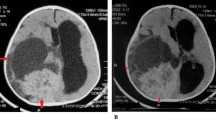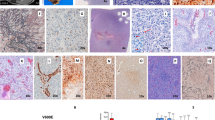Abstract.
In the present study the clinical data, histology, proliferation rate, DNA ploidy status and the results of TP53 mutation analysis and comparative genomic hybridization (CGH) of three typical cases of desmoplastic infantile astrocytoma and ganglioglioma are presented. Postoperative disease-free intervals of 11, 8 and 3 years were recorded and in none of the cases were radiological signs of tumor recurrence. No TP53 mutations (exons 5–8) were found. CGH analysis revealed loss of 8p22-pter in one case, while in another case gain of 13q21 was detected. In the case with the follow-up of 11 years an aneuploid DNA-flow cytogram along with slightly increased MIB-1 labeling index (LI) was found. The results demonstrate little genetic instability in these low-grade lesions. DNA-aneuploidy seems not to be indicative of tumor progression. It is concluded that the genetic aberrations found in desmoplastic infantile ganglioglioma differ from those encountered in common astrocytomas.
Similar content being viewed by others
Author information
Authors and Affiliations
Additional information
Electronic Publication
Rights and permissions
About this article
Cite this article
Kros, J.M., Delwel, E.J., de Jong, R.T. et al. Desmoplastic infantile astrocytoma and ganglioglioma: a search for genomic characteristics. Acta Neuropathol 104, 144–148 (2002). https://doi.org/10.1007/s00401-002-0534-8
Received:
Revised:
Accepted:
Published:
Issue Date:
DOI: https://doi.org/10.1007/s00401-002-0534-8




